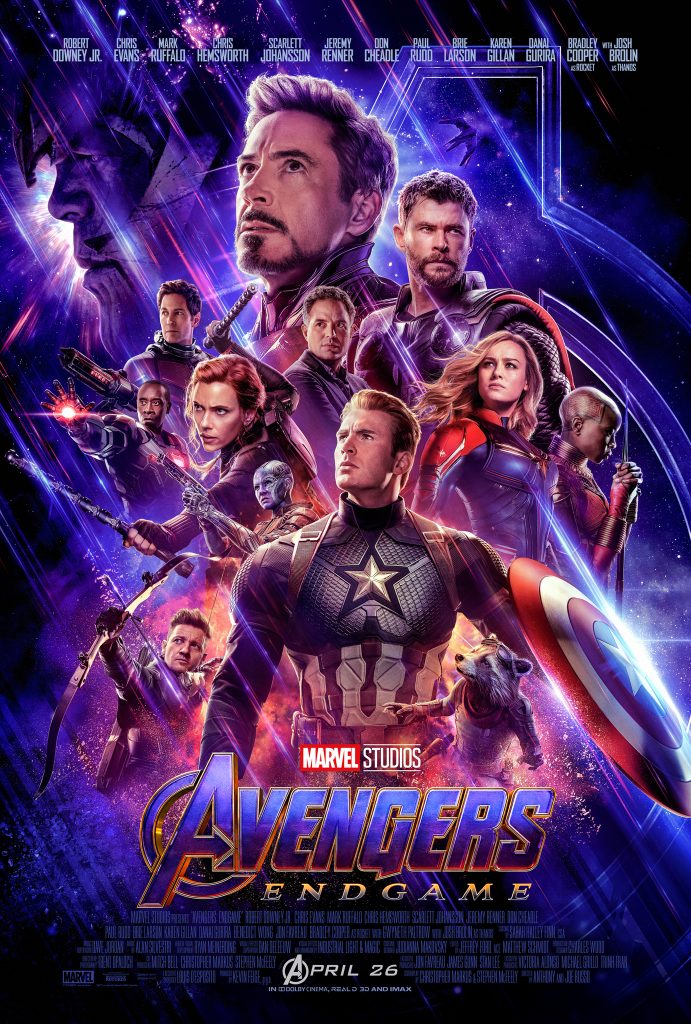
Spoiler Alert: Okay first of all, if you have not seen “Avengers: Endgame” and are invested in this film, please do not read this review until you see it. I don’t think it can be reviewed in its entirety without referencing some specifics. So I repeat, do not spoil this film for yourself by reading this before you watch it.
Endgame concludes an 11-year long journey for Marvel fans. The movies, which started on the basis of human stories, have developed into an intergalactic mega-story. “Endgame” itself is visually astonishing. It has epic action scenes. It plays on our expectations of superheroes but is still surprising. It contains the most satisfying, cheer-inducing moments from the entire franchise. It knows exactly when and how to use its array of theme songs.
In short, “Endgame” is the ultimate superhero film.
But what stands out to me as the movie’s true strength, is its attention to character development and resolution – specifically in the cases of Tony Stark/Iron Man and Steve Rogers/Captain America.
Stark had long been struggling with the proper way to respond to the dangers of the world. While the fears become most obvious in Iron Man 3, this initial discomfort is apparent in even the first Iron Man movie – when he considers his role in the murder of Americans.
After this initial realization, Stark strives to protect people. He envisions total protection of the earth and is haunted by nightmares of the defeat of the Avengers. “Endgame” displays the extent of Stark’s development – he finally confronts the demons he has grappled with for years.
Stark shines through as a genuinely human hero. Robert Downey Jr. has always embodied the character and made us all empathize with the “genius, playboy, billionaire, philanthropist” that started the Marvel journey. In “Endgame,” Stark reacts to the traumatic events of Infinity Way in a human way. He does not shield his personal journey, emotions, or interests – because no one truly could.
Stark expresses humanity in a way many of the other heroes do not. He chooses to resolve his fate. He takes the initiative to sacrifice himself for the good of the world. Ultimately, he fulfills the duty that was always his. He maybe didn’t act like a stereotypical hero, but Stark was the deeply human man, striving to do his best, confronting the unimaginable who resolved his own story.
Stark was always a leader of the Avengers. He strove to protect the world. He struggled between balancing personal desires and his commitment to duty. Marvel resolved his story in a wholesome way. The restlessness that kept him up is gone. He can rest – as can his fans.
[Spoiler!] *Neat little sidenote: The unknown man at Tony’s funeral is the kid from Iron Man III. I know, I’m crying too*
Captain America also got his resolution. For so long, he tried to square his past with the present. His clear sense of right and wrong with the murky, complicated world into which he was thrown. There was never really the chance of a happy ending for Captain America. He was doomed to be the protector of good – whether he was accepted or not. He balanced between his loyalty to his past and the rapid changes of his modern world. Captain America was bogged down by the weight of loss and responsibility.
In the end, Captain America fulfilled his duty while also getting his happy ending – the happy ending he always deserved. He left the world in good hands and got his sense of peace.
Thor, on the other hand, had very little tangible character development written into the script. Chris Hemsworth acted the hell out of the role and, despite the lack of obvious character resolution and development, showed the humanity and struggles that deepened the character. Thor’s story in the Marvel universe is likely not over, and hopefully Hemsworth can continue adding depth to the character.
Hemsworth is just one of a star-studded cast who recognized the emotional depth of these larger-than-life characters. The movie is chock-full of wild stories, but is still personal. Fans are committed to the story lines and the fireworks but also to the heroes themselves.
As individual characters struggled with their ultimate fate, so has the franchise as a whole. One theme of “Endgame” is the inevitability of Thanos – but it also tests the inevitability of the character’s fates. The characters, specifically Stark and Captain America, are drawn to their inevitable fate, but clearly make active, considered decisions in the process. Marvel was always building to this end. The end that grapples with its own meta-fate of sacrifice and inevitability. The fate that was surprising but satisfying.
The fans identify with the characters and with the progression of films themselves. Marvel inspires the questions and consideration of reality within its fantasy. Viewers take the characters seriously. We look deeper for more understanding because we care about the stories and the characters. Marvel created a shared fantasy world that allows fans to consider their own relationship to inevitability and other themes. These films, and “Endgame” specifically, facilitate imagination and emotional connection in a largely bland and disinterested world.
The movie is not perfect. The use of Captain Marvel and Bruce Banner/Hulk seems lazy. The resolution of time-travel is quite unrealistic. Not all characters get the development they deserve. But it provides the necessary resolution. It does what it needs to do without being five hours long. It was the finale to the original story that fans awaited – and it was the finale the characters themselves deserved.
